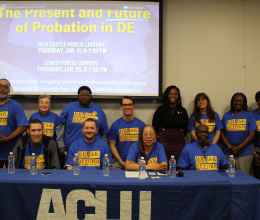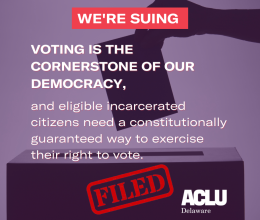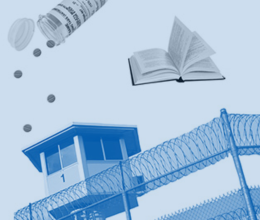
March 18, 2016: The district court ruled on March 16, 2016, that we have the right to proceed with the federal law claim. Judge Sleet agreed with us that:
- the CLASI (Community Legal Aid Society, Inc.) lawsuit has standing
- CLASI raises valid claims of cruel and unusual punishment (Eighth Amendment violations)
- CLASI's claims are not barred by the Eleventh Amendment
Judge Sleet did accept the DOC's argument, which we did not oppose, that we cannot also assert a violation of the state constitution.
For more information, see below:
3 15 16 Order on motion to dismiss Memorandum Opinion on Motion to Dismiss 3-16-16
August 6, 2015: At least 100 people with mental illnesses are being held in solitary confinement by the Delaware Department of Corrections under conditions known to make mental illness worse and cause paranoia, self-mutilation, and suicide attempts, according to a lawsuit filed in federal court by plaintiff Community Legal Aid Society, Inc. (CLASI). The suit argues that this treatment of those with mental illnesses violates both the U.S. Constitution and the State of Delaware Constitution.
CLASI is also co-counsel on the lawsuit along with the American Civil Liberties Union Foundation of Delaware and Pepper Hamilton LLP.
At the James T. Vaughn Correctional Center in Smyrna, people with mental illnesses have been warehoused in solitary confinement for years on end, living in 8’x11’ cells for 23 to 24 hours a day. They are isolated from almost all contact with other human beings and receive virtually no meaningful mental health treatment,” said Daniel Atkins, executive director of CLASI.
"Someday, the vast majority of these inmates will be released back into the community. How are these individuals or the community at large served by such cruel and destructive policies and practices?” Atkins continued.
Approximately 300 prisoners are held in the Secure Housing Unit (SHU) of the correctional center in Smyrna, including 100 listed on DOC’s mental health roster, more than 60 of whom have serious mental illnesses. Isolation under these conditions exacerbates the symptoms of mental illness and can result in behaviors such as screaming obscenities, throwing feces, banging body parts against the cell walls, and other self-inflicted injuries. Prison officials often regard these manifestations of disease as prison rule infractions and punish these prisoners with more time in solitary and further limitations on privileges such a phone time, family visits, and the opportunity to purchase a television or radio.
In the SHU at Smyrna, most prisoners are permitted to leave their solitary cells for only one hour, three days a week: 45 minutes in a wire enclosure to “exercise” without equipment and 15 minutes to shower. They can’t work, participate in education or rehabilitation programs, or attend religious services, even though such activities have been shown to improve mental health and wellbeing.
Supreme Court Justice Anthony Kennedy recently recognized that solitary confinement can bring you to the edge of madness, perhaps madness itself,” said ACLU legal director Richard Morse. “It is time to put an end to a system that holds mentally ill people under conditions that make them worse. This lawsuit aims to do that,” Morse said.
The lawsuit argues that the current solitary conditions under which inmates with mental illnesses are housed by the DOC is a violation of the Eight Amendment of the U.S. Constitution, which prohibits cruel and unusual punishment, and Article I, Section 11 of the State of Delaware Constitution, which prohibits cruel punishments and requires that jails have a proper regard for the health of the prisoners. The suit asks that the court mandate appropriate relief in order to stop the constitutional violations.








